Part 1 Pacesetters - Part
3 A season falls apart - Part 4 A summer
of change - Results and table
Leeds United have never been strangers to controversy … the questionable
tactics used to become one of the most difficult sides to beat in the
Sixties … the oft-alleged hints of bribery and corruption by Don Revie
… dubious refereeing decisions at key moments which always seemed to go
against the team … the thuggish displays of violence by their followers.
Indeed, Leeds United Football Club owed its very birth to the scandal
that surrounded their predecessors Leeds City in 1919.
However, even that particular period in the history of West Yorkshire
football pales into insignificance when set against the extraordinary
events which surrounded the club in the first few months of the
New Millennium, culminating in what became notoriously known as
the Leeds United Trial. The club itself was not in the dock, but
it may as well have been, for the media feeding frenzy that arose
threatened to engulf and destroy everything to do with Elland
Road.
The story began in January 2000, while David O'Leary's youthful side
was enjoying a quite extraordinary season, launching a challenge to the
all-conquering Manchester United's Premiership dominance. On 9 January,
Leeds enjoyed a breathtaking 5-2 win away to Manchester City in the FA
Cup and then faced a couple of weeks of on-field inactivity. The break
arose because of the decision of Manchester United to forego their defence
of the FA Cup, preferring instead to chase the glory of the World Club
Cup competition in Rio de Janeiro.
Some of the Leeds United players decided to go out drinking on the evening
of Tuesday 10 January in the city centre, including Lee Bowyer, Michael
Duberry and reserve striker Tony Hackworth. Jonathan Woodgate, who still
lived in his Teesside home, went out on a bender in Leeds the same night
with some of his old friends from Middlesbrough including Neale Caveney
and Paul Clifford. Woodgate and his mates got riotously drunk and ended
up in the early hours of Wednesday morning at a city centre nightclub.
According to David O'Leary in his book, Leeds United On Trial,
'On the dreadful night of the attack Woody hadn't been out with Leeds
team-mates, he was partying with his Middlesbrough friends. As the court
was to hear, one of them, James Hewison, who was not on trial, was very
drunk and got into a ruck at the Majestyk Nightclub. Woody spotted his
friend holding a bottle and looking as if he was about to hit someone.
The club bouncers threw Hewison out, only for the trouble to continue
on the steps outside when a group of Asians mocked him for being unable
to hold his drink. It was Woody who tried to calm him down; Woody who
tried to push him into a taxi to defuse the situation. But several attempts
to placate his friend were to no avail. I remember Mr Justice Poole pointing
out in his summing-up that the comparisons made by lawyers between Hewison
and a gorilla or orang-utan were 'not particularly accurate' as those
animals were quiet and sensible.
'In the early hours paramedics were called to an emergency in a side
street in Leeds city centre. They found Sarfraz Najeib, a student, lying
on the pavement in Mill Hill. His face was fractured in six places and
his leg broken. He bore teeth marks from a bite on the side of his face,
together with the imprint of a shoe left by a kick or a stamp.'
Sarfraz Najeib had gone to the nightclub with his brother Shahzad and
three friends, all students at Leeds Metropolitan University. When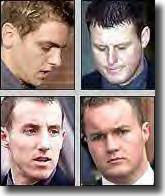 the students left they got involved in a verbal confrontation with one
of Woodgate's friends, who had just been ejected from the club. A spokesman
for the West Yorkshire force said the five Asian youths were being chased
along Mill Hill when one of them fell over. The group of white men then
attacked him.
the students left they got involved in a verbal confrontation with one
of Woodgate's friends, who had just been ejected from the club. A spokesman
for the West Yorkshire force said the five Asian youths were being chased
along Mill Hill when one of them fell over. The group of white men then
attacked him.
Bowyer, Woodgate, Hackworth, Caveney and Clifford were charged with causing
grievous bodily harm with intent to Sarfraz Najeib. All five were also
charged with affray, and all apart from Bowyer were charged with conspiring
to pervert the course of justice.
Everyone at Elland Road was shocked at the accusations, especially as
initially there were hints that the attack had been racially motivated.
A media circus soon descended and all but destroyed United's season. There
may have been other factors, but certainly the team's form fell apart
in the weeks that followed.
Events were creating a siege mentality around the club and David O'Leary
echoed the feelings of many: 'My suspicions of a political agenda were
intensified by the debate surrounding the date of the trial. In September
2000, after the players had been committed for trial, the Crown Prosecution
Service said that their case would be ready for January 2001. Leeds United's
lawyers had pointed out that if the trial took place during the season,
the club would be 'severely penalised in financial terms from the loss
of a number of players as defendants in the case, and to a lesser extent
as witnesses'. Mr Justice Henriques decided to delay the court appearance
until June 2001, explaining that the club's representations were one of
the factors he had taken into account in choosing to wait until the end
of the football season.
'Suddenly we found the decision taken by a High Court judge called into
question. Lord Dholakia, a Liberal Democrat home affairs spokesman and
former adviser to the Judicial Studies Board, said that he would be "seeking
an explanation" for the delay from the Lord Chancellor, Lord Irvine.
"I'm shocked and surprised that the judge should take into account
representations of that nature," he said. "It is wrong because
if justice is delayed, it is denied to people who are striving to find
the courts will deal adequately with cases of this nature."
back to top
'Mr Justice Henriques responded: "Any company chairman making representations
of this nature would have them considered by a judge in the setting of
a trial date involving a number of that company's employees." However,
he said that the principal reason for the date he had selected was fitting
the trial into the court calendar: the new legal term beginning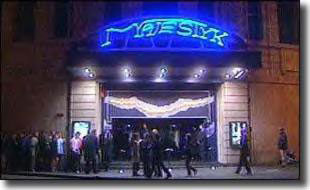 that autumn was too early and the Easter term too short for a trial expected
to last six weeks, which left only the Trinity term, beginning in June
2001.
that autumn was too early and the Easter term too short for a trial expected
to last six weeks, which left only the Trinity term, beginning in June
2001.
'Nevertheless the judge's decision was overturned and the date was set
for 29 January 2001. I imagine that the defence legal teams must have
realised from that moment that the politicians would continue to involve
themselves in the business of the courts.'
As players on the verge of selection for the full England squad, Woodgate
and Bowyer received most of the press attention. However, they coped very
differently with the speculation and the condemnation.
Woodgate virtually disintegrated during the trial, becoming thin and
haggard and betraying the impacts of many nights' lost sleep in the dark
circles under his eyes. He played no more games that season following
the commencement of the trial. A convenient ankle injury was cited as
the reason, but in reality it was psychological problems rather than physical
ones that kept the defender on the sidelines.
Bowyer was a completely different case, playing the best football of
his career and eventually winning the accolade as the club's Player of
the Year in the eyes of both players and supporters. That his performances
came against some of the best teams in Europe made them even more remarkable.
David O'Leary: 'Lee Bowyer's performances for Leeds during the trial
were phenomenal. His ability to deal with the situation and deliver on
the football pitch was epitomised by his performance against Anderlecht
in February, when the prosecution evidence was being heard. Having chased
from the court to Elland Road for the Champions' League match, he scored
the winning goal in a 2-1 triumph with four minutes remaining. On the
eve of the game, Anderlecht players had suggested that they would attempt
to exploit Bowyer's temperament and he was hit with a couple of tough
challenges from Bart Goor. But Lee simply picked himself up, dusted himself
down and got on with the game. Any hopes the Belgians might have had of
rattling him were totally unfounded. Neither Bow nor the rest of the Leeds
team could have wished for greater support from the Elland Road faithful.
Deafening chants of "Bowyer for England" rang out around the
stadium, especially after he had driven home our last-gasp winner to defeat
the supremely confident Belgian champions.'
Luckily, with the trial being held in Hull, it was usually possible for
Bowyer to get from the day's proceedings to Elland Road for mid-week games,
although some away matches were impossible to reach. Bowyer was the star
turn as Leeds went undefeated throughout the period of the trial.
Midway through proceedings, the case against Tony Hackworth was dropped
when Mr Justice Poole ordered the jurors to acquit him after deciding
there was insufficient evidence against him.
However, other matters were not going so positively and some of Michael
Duberry's testimony proved damaging to Woodgate, Caveney and Clifford.
He told the jury: 'I asked him where he had been, and he said they had
just had a fight with some Asians. He was walking and talking at the same
time.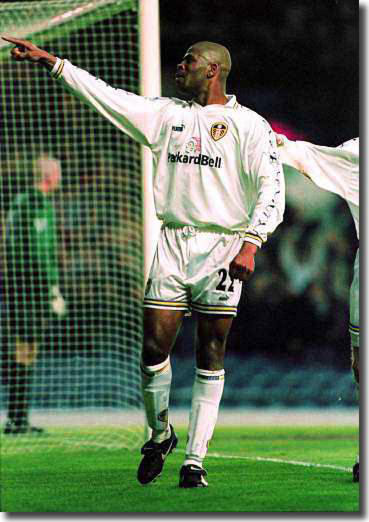 I didn't ask him who was involved, that was the only thing that came out.'
Things looked bad. The matter led to long-term acrimony between Duberry
and Woodgate.
I didn't ask him who was involved, that was the only thing that came out.'
Things looked bad. The matter led to long-term acrimony between Duberry
and Woodgate.
The jury retired to consider their verdicts at the beginning of April,
and not guilty results on conspiracy were the first to be given, on 5
April. The jury continued to consider the other verdicts over the weekend
of 7/8 April.
On Monday, 9 April came some sensational news - the trial had been halted
following the publication of a 'prejudicial' newspaper article. Trial
judge Mr Justice Poole said the case against Bowyer, Woodgate, Caveney
and Clifford could be prejudiced by an interview with the alleged victim's
father printed in the Sunday Mirror. He said the article's suggestion
that the attack was racially motivated, when the jury had been instructed
otherwise, was deeply concerning.
The judge dismissed the jury of seven men and four women - who had been
considering their verdicts for 21 hours over three days - after learning
that some of them had seen the Sunday Mirror article. 'It is, to
put it mildly, not at all desirable that a crime and therefore a suspect,
should be labelled racist when it is the prosecution submission they are
no such thing,' said Mr Justice Poole. 'The whole misleading issue of
a racial motivation which the prosecution and defence have sought to exorcise
has been revived and placed before the jury in highly emotive terms.'
The judge said there was 'a clear and substantial risk of prejudice raised
by the article', adding that justice would not be served if the trial
continued.
The court hearing, which had already cost £8m, was postponed until October
when Bowyer, Woodgate and the others would be tried again.
back to top
Leeds chairman Peter Ridsdale said he was not allowed to say anything
about the trial itself but told reporters he was stunned by the ruling.
'After I read the newspaper article, I knew it could be very damaging,'
Ridsdale said. Like everyone else, he had been expecting a verdict so
that Leeds could plan ahead with or without Woodgate and Bowyer. 'We are
all so surprised that no-one is yet in a position to comment in terms
of how this will impact the club.'
It was very much a worst-case scenario, then, with the speculation and
newspaper intrigue going on for a further six months. There had been some
speculation that the retrial would never happen because justice was impossible
given all the damaging publicity, but this was a vain hope and proceedings
commenced, again in Hull, at the beginning of October 2001.
The retrial lasted another couple of months, and it was on Friday, 14
December 2001, that the final verdicts on events that had taken place
almost two years previously were announced.
The Times: 'Both Jonathan Woodgate and Lee Bowyer were cleared
at Hull Crown Court of assaulting Sarfraz Najeib, 21. However Woodgate,
21, was found guilty of a lesser charge of affray. The central defender,
who has played once for England, escaped a prison sentence that could
have ended his footballing career because the judge said he had suffered
enough after two trials and 23 months with the prospect of jail. "You
have suffered agonies," Mr Justice Henriques told him. "It is
etched on your face."
'Mr Bowyer, 24, was cleared of all charges but was ordered to pay his
legal costs of more than £1m because of the numerous lies the judge said
he told in police interviews. Woodgate also faces paying costs of well
over £1m.
'Paul Clifford, 22, from Middlesbrough, was sentenced to six years in
jail for his leading role in the assault. Like Woodgate, Neale Caveney,
22, of Nunthorpe, was found guilty of affray. The verdicts came after
almost five days of deliberation by the jury. Woodgate was initially found
guilty of the lesser charge of affray, while Mr Bowyer was cleared of
grievous bodily harm. The jury of seven women and five men were sent back
to try to deliver verdicts on two remaining charges: grievous bodily harm
for Woodgate and affray for Mr Bowyer.
'More than 90 minutes after the jury had first appeared, Woodgate was
cleared of being involved in the attack. He looked stunned. After another
20-minute wait, the judge sentenced him to 100 hours' community service.
As soon as he left court, Woodgate hugged his father, Alan, his sister,
Stephanie, and Linda Purnell, his former teacher, who appeared as a character
witness.
'Mr Bowyer puffed out his cheeks in relief as he was acquitted. Outside
the court he said: "I'd like to thank everybody for sticking by me,
that is the people who have, and I won't forget that. People from the
club at Leeds United who stuck behind me for the last two years were the
manager, the chairman and the players and especially the supporters."'
Peter Ridsdale gave the club's reaction in a press conference: 'You can't
quantify the damage that this has caused. None of us have wanted to go
through this and despite the fact that we as a club were not on trial
the mere fact that we are here today demonstrates that the two linked
together and at the end of the day people have perceived Leeds United
to be as responsible as anybody else. But Leeds United have not been on
trial. I would like to say that there is no hint of racism at this club
and I was very happy to hear the judge in the case say that there were
no racial motives in the attack. Leeds United has been in a very difficult
position but we allowed both men to keep playing because we believe that
they were innocent until proven guilty. The trial is 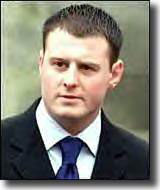 now
out of the way. We now want to go back to playing football and try to
get back to some kind of normality.
now
out of the way. We now want to go back to playing football and try to
get back to some kind of normality.
'We recognise that all of our players are in the public spotlight. If
they do anything deemed inappropriate we know they are made sure of the
consequences of that. We will be taking internal disciplinary action against
Jonathan. We considered very carefully what we would do in certain circumstances
and we do not take this lightly.'
The affair rumbled on over the weekend as the Sunday Times ran
several pages on the affair, including a focus on the reaction of David
O'Leary, who seemed particularly irate at his two players:
'David O'Leary last night said Lee Bowyer and Jonathan Woodgate had told
him lie after lie when he attempted to establish the truth about what
happened to Sarfraz Najeib. O'Leary also criticised them for damaging
the reputation of the football club and undermining his quest for Premiership
glory. "When the full picture began to emerge I sat all the players
down and, pointing at Bow and Woody, I said: These two have disgraced
us all. They were running round Leeds drunk that night. The terrible consequence
of the evening was that a human was left lying on the floor as though
he was nothing more than a piece of meat."
'There have been times over the past three years when David O'Leary has
confided his dissatisfaction with the drinking habits of some of his players.
He disapproved of players socialising in Leeds city centre and preached
to them about the dangers of alcohol abuse. Among those who listened were
some who would not hear.
'O'Leary will renew his campaign to ensure his players behave more responsibly.
Yesterday the club announced a new scheme to promote a better lifestyle
and to offer guidance on the consumption of alcohol. 'We will make it
clear to players throughout our club that excessive drinking will not
be tolerated,' said a club official. Whatever the new guidelines, no player
is now in a position to demur.
'The irony is that the vast majority of the first-team squad at Leeds
are excellent professionals. Players such as Nigel Martyn, David Batty,
Olivier Dacourt, Danny Mills, Rio Ferdinand, Jason Wilcox and Mark Viduka
do not need to be lectured on the dangers of alcohol. The young striker
Alan Smith is a non-drinker.
'Had they been in the gallery at Hull Crown Court last week, the Leeds
players would have perfectly understood the potential consequences of
alcohol abuse; there would be less need for new schemes and old sermons.
The harrowing details of the beating suffered by 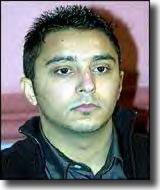 Sarfraz
Najeib and the ordeal necessarily inflicted on the accused were the most
telling commentary on the dangers of alcohol abuse.
Sarfraz
Najeib and the ordeal necessarily inflicted on the accused were the most
telling commentary on the dangers of alcohol abuse.
'Leeds United are, unquestionably, the most exciting young football team
in Britain. O'Leary is the man who has created the team, encouraged them
to play attacking football and raised expectations to a level last experienced
at Elland Road during the halcyon days of Don Revie's team in the early
70s. Unlike Arsène Wenger at Arsenal, Gerard Houllier at Liverpool and
various managers of Chelsea, O'Leary has sought to build an empire based
largely on English and English-speaking players. He has avoided buying
continental Europeans and has nurtured an ethos at the club that is primarily
British. It is an admirable aspiration that has been deservedly praised.
But it was certain that O'Leary's homogenous group would reflect both
the strengths and the weaknesses of the native football culture. As well
as the grit and the spirit of the English footballer, there is also the
drinking culture that has long been part of the British game.
back to top
'The situation was compounded by Leeds' greatest strength also being
the weakness. Because so many of the players are young, the team has uncommon
potential. But it is the youthful players who are most vulnerable to temptation
and least likely to drink sensibly. All that happened that January night
would not have taken place without staggering consumption of alcohol.
Neither was it the first time that some Leeds players had drunk stupidly
and misconducted themselves.
'For O'Leary, this has been particularly difficult to accept. During
his 20 years at Arsenal, he was an exemplary professional and a virtual
non-drinker. He lived then like the modern continental footballer. Saturday
was his night out and it involved nothing more than eating at a Chinese
restaurant with his girlfriend Joy. Later, when they married, he would
take home the Chinese food.
'Though he preached to his players on the dangers of alcohol abuse and
warned them about socialising in city-centre bars, the message never quite
got through. O'Leary's abstemious reputation as a player would have made
it harder for him to convince the players; just as a celibate priest is
often disadvantaged when dealing with marital difficulties.
'While O'Leary cannot be blamed for the excessive drinking that led to
so many problems for Woodgate and Bowyer, it will be expected that he
can ensure proper behaviour from his squad in the future. It was regrettable
that the manager did not speak publicly on Friday, and his decision not
to do so raises questions about his judgment.
'Officially, Leeds said it was their decision that Ridsdale should deal
with the matter. But on one of the biggest days in this team's evolution
it was important for O'Leary to address the issues. The more plausible
explanation for his reticence lies in his exclusive column in the Sunday
People. It is not uncommon for newspapers to demand exclusivity from well-paid
columnists on more newsworthy occasions, and O'Leary's silence may have
related more to the Sunday People than to club policy. The difficulty
for the man who demands the highest standards of behaviour from others
is that he himself must be beyond reproach. Leeds's explanation for keeping
the manager on the sidelines was also undermined by the knowledge that
his forthcoming book, Leeds United On Trial, is serialised in today's
News of the World. The book is an account of the traumatic 2000-01 season
and is one O'Leary was genuinely keen to write.
'However, it deals with the investigation and trial of Woodgate and Bowyer
and leaves O'Leary open to the accusation that he stands to profit from
an appalling chapter in the club's history. Asked on Friday if he saw
a danger in the timing of this serialisation, Ridsdale said: 'I can't
comment on what David has done as an individual, the club have not done
anything. If people perceive what David does in that way (that he is profiting
from the controversy surrounding the trial), well, that's disappointing.
We, as a football club, are not profiting out of the events that have
happened. We will merely take stock of the events and try to do the right
things for the future.'
'Asked if he would prefer if the book was not serialised today, Ridsdale
said: "That's out of my control." He then refused to comment
on whether he approved, adding that the manager had the right to say in
the public arena what he wanted to say: "That's what I do and if
the manager has chosen to do that, so be it."
back to top
'While the future is uncertain, nobody can question that the Woodgate-Bowyer
affair marks a turning point in the development of O'Leary's young team.
If it accentuates its maturation, it will have a positive effect. There
will be no difficulty re-integrating Woodgate and Bowyer into the first-team
squad, for they are naturally fit footballers and they will want to prove
themselves again on the pitch. Both were back on duty at the club yesterday.
'O'Leary must deal with the rift between Woodgate and his fellow centre-back,
Michael Duberry. The two players were once close friends but have fallen
out since Duberry responded to a subpoena and testified in the retrial.
His testimony implicated Woodgate and fellow defendant Clifford.
'It is not uncommon for footballers in the team not be best chums but
O'Leary will want Duberry and Woodgate to make up. How can the team move
on if the coolness between the two players continually reminds them of
the past? The club believes Woodgate has a duty to be receptive to whatever
is asked of him. "In the case of Jonathan," said Ridsdale, "he
has an even harder job to restore everybody's confidence in him as an
individual and I think we would expect more from Jonathan than we would
from other players. He has let his family down, himself down and he's
let down the football club. He has damaged our reputation."
'Leeds say Woodgate will face internal disciplinary measures and may
have to move from his home town of Nunthorpe, near Middlesbrough, to a
location closer to Leeds. The club has never approved of Woodgate commuting
from Middlesbrough or of the company he keeps when he returns home.
'It is equally true that there is tremendous affection for Woodgate at
Leeds. The misdemeanours of his past constitute one side of his nature
and by no means the dominant side. To his teammates, he is a little daft
but hugely likeable. Everybody accepts his enormous quality as a player.
Should he be accepted back into the England fold, he would be a contender
for a place in Sven-Göran Eriksson's World Cup squad.
'In terms of the team's challenge for this year's Premiership, last Friday's
result at Hull Crown Court is crucial. There is no certainty that Leeds,
with Bowyer and Woodgate free to give their best, will go on to take the
title. But without them, the team would not have had a chance.
'Though the defence has performed admirably this year, O'Leary will be
thrilled at the prospect of re-discovering the old Woodgate. When he 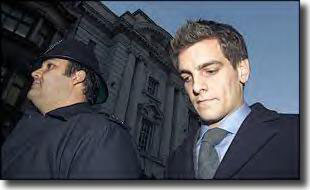 was
charged almost two years ago, Woodgate's form dipped and once the first
trial began last February, it slumped. He has been a shadow of a once
great centre-back.
was
charged almost two years ago, Woodgate's form dipped and once the first
trial began last February, it slumped. He has been a shadow of a once
great centre-back.
'With Woodgate back in training, O'Leary can dream of teaming him and
Rio Ferdinand in the middle of his defence. Potentially, they are the
best central defensive partnership available to any side in the Premiership.
The events of the past two years will not be easily forgotten, but they
ensure the club's fortunes will be followed more closely than ever before.
'The jury at Hull Crown Court returned last Friday, so Woodgate and Bowyer
will be part of the club's immediate future. The jury in the case of David
O'Leary and his team are still out.'
back to top
It was a startling piece of writing and the first stirring of any real
public criticism of O'Leary since he took up the role of manager at Elland
Road. His book, Leeds United On Trial, was seen as cynical manipulation
of the media interest, and all the former good natured ribbing of his
'naïve young manager' image now became much more pointed and unforgiving.
The pressure had clearly started to eat away at the likeable Irishman.
And while Lee Bowyer may have been found innocent of all charges, the
affair was not over for him yet. He still had to face two outstanding
charges for misdemeanours on the pitch that had been postponed until the
trial was over, and they were seen by some as a way of keeping the all
action midfielder out of contention for international selection.
Just as damaging, however, was the feud that erupted between player and
club. Peter Ridsdale: 'Following the conclusion of the trial last Friday,
Leeds United Football Club, as previously indicated, has reviewed appropriate
internal disciplinary action against Lee Bowyer and Jonathan Woodgate.
'The club acknowledges and accepts the verdict of the jury that Lee Bowyer
was innocent of all charges. Nevertheless, and in his own admission, he
was under undue influence of alcohol in the city centre late at night,
which is against the club's code of conduct.
'Jonathan Woodgate was found guilty of affray and was sentenced at Hull
Crown Court. The PFA maximum fine ceiling is two weeks' wages. Following
the internal disciplinary meeting between the manager, David O'Leary 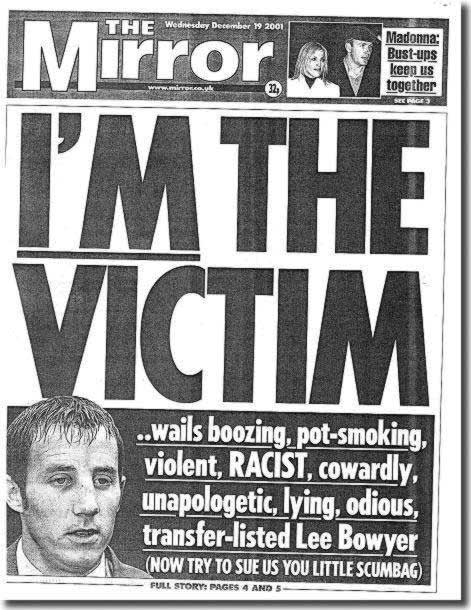 and
myself, Jonathan Woodgate has been given a fine of eight weeks wages.
Jonathan has asked that this money be put towards funding work within
our inner city communities, which we are more than happy to agree to.
Jonathan will commit to work within our community programme. Jonathan
has also been given a final warning regarding his future conduct.
and
myself, Jonathan Woodgate has been given a fine of eight weeks wages.
Jonathan has asked that this money be put towards funding work within
our inner city communities, which we are more than happy to agree to.
Jonathan will commit to work within our community programme. Jonathan
has also been given a final warning regarding his future conduct.
'Leeds United has imposed a fine of four weeks wages against Lee Bowyer,
we would also insist that Lee work at the forefront of our community programme
for the whole of the balance of his contract. Lee has also been warned
regarding his future behaviour both on and off the field.
'Regrettably, Lee Bowyer has refused to accept this club disciplinary
sanction and has, therefore, been placed on the transfer list with immediate
effect. As a result of this Lee Bowyer will not be available for team
selection by David O'Leary unless he accepts the club's disciplinary sanction.'
In the end Bowyer accepted his punishment, albeit grudgingly and resumed
his first team duties, but harboured bitter resentment for months afterwards
and refused to accept a new contract when it was offered because of what
he saw as an injustice.
Clearly, the affair was not done, but it seemed to make little difference
to Bowyer's performances on the field. He returned to the side for a home
game with Newcastle United on 22 December, with the Geordies now themselves
in contention for the Premiership. Bowyer was as outstanding as he had
ever been in a white shirt, but the story was a different one for Leeds
United.
The Sunday Times: 'Early in the second half, the swirling snow
formed faint shades of white on the Elland Road pitch. It came to purify
the atmosphere, to belatedly bring the festive season to the beleaguered
men of Leeds. But then, 3-1 in front, the home defenders swirled as incoherently
as the snow. Before the end, a white Christmas had become a black and
white Christmas.
'It was at once painful and demoralising for the home team. To lose a
two-goal lead in the final 30 minutes is one thing, to throw away a match
winning lead at home is quite another. But Leeds didn't just fade in the
final quarter, they disintegrated. Yesterday they squandered another two-goal
lead in the last 30 minutes. It was all the more difficult to take because
this was Leeds with their prodigal son returned from exile: Lee Bowyer
started, scored a goal and performed well.
'Seven weeks have passed since Bowyer last wore his No 11 jersey. Since
then he has sat in the dock of Hull Crown Court and wondered how long
it would be before he played his next game. Since walking free from the
courtroom, he has been vilified. But he is a man of uncommon resilience:
the slings and arrows seem not to wound him.
'Not only did Bowyer seamlessly return to the company of his fellows,
but he played with restraint and good manners. If he means to show a better
attitude in the future, this was an encouraging start. In danger of making
a late tackle, he held back; when decisions went against him, he didn't
so much as demur and he gave everything he had to the team.
'Perhaps the least surprising aspect of his performance was that he was
still the same gifted young footballer. His goal, six minutes before half
time, reflected the essence of his quality. Leeds had just gone a goal
down and needed to get back into the game. Few saw the opportunity as
the ball was played through to Mark Viduka, but Bowyer did. Surging from
midfield, he cut through Newcastle's defence and when Viduka played the
pass, it was as if the prodigal son had never been away. His first touch
steered the ball inside Nikos Dabizas's tackle, his second nudged it into
position and, half a second later, the net was shaking.
'Much of the week's angst was released in the players' celebration. Their
joy was palpable and barely controlled. Near the Leeds dugout at halfway,
Brian Kidd quietly turned and shook David O'Leary's hand. Theirs was a
different emotion, more relief than joy, but no less intense.
back to top
'The goal seemed a turning point: why else had the gods ordained that
Bowyer would score, if not to lead the team to victory? That was how Leeds
saw it and their morale soared. Ten minutes into the second half, they
were 3-1 up and the Yorkshire air was speckled with dancing snowflakes.
'But this Christmas card from Elland Road is rather sombre. Doleful,
in fact. Leeds leaked three goals in the last 30 minutes and, just now,
they are far from a good team. Without the injured Dominic Matteo, they
moved Danny Mills to centre-back and Gary Kelly to right-back. Defensively,
they were shocking.
'Mills and Rio Ferdinand were unnerved by Craig Bellamy's pace and never
formed a partnership. On the left side of Leeds's defence, Ian Harte's
fragility has moved on from being a weakness to being a burden. Kieron
Dyer skinned him for the first goal, while Nolberto Solano got past him
for the fourth.
'It would be wrong to see yesterday's collapse solely in terms of the
defence. When Leeds were 3-1 up, the game was theirs. It was the time
to shut up shop and protect what they had. It is an art this young team
has yet to acquire. Neither should anybody think yesterday's vulnerability
was a one-off. A coasting is a dangerous business and Leicester came up
with two goals and earned a draw. Four days ago, Leeds led Everton 3-0
but too easily conceded two late goals to their rivals. It was going to
catch up with them and, my goodness, how it did.
'Afterwards, O'Leary sat wearily down to rake through the ashes of the
dead match. He praised Bowyer for his performance and expressed his disappointment
at the loss of the two-goal lead.
'Thinking a little ahead, the Leeds manager looked forward to being able
to concentrate on the management of the team. 'After what we've been through,
managing the actual team will be a doddle,' he said.
'It will certainly be easier than dealing with the aftermath of the most
traumatic week in the history of the club, but a doddle? Not after yesterday.
O'Leary has much to do before he rediscovers his team.
'It is a test of his management and he will relish it. Just now, at the
turn of a bleak year for the club, the team does not look good enough
to win the Premiership. Self-belief has been one of O'Leary's strengths.
He will need it through the coming months.'
Four days later, the result seemed a lifetime away as Leeds put all their
cares behind them when a hat trick from Robbie Fowler secured an impressive
3-0 victory at Bolton. 'He's a clinical finisher,; O'Leary beamed, although
the penalty that the Scouser missed seemed to suggest otherwise. The manager
was likewise delighted with his defence, now with Woodgate reinstated
alongside Ferdinand: 'I think there's a partnership there that will be
as good as anything in the country for years to come. Our concentration
was a lot better at the back. It's about finishing games off, learning
to keep the ball.'
When Bowyer grabbed the only goal in the 89th minute away to Southampton
on 29 December, it looked like Leeds United had finally put their sluggish
run behind them and were back in the groove. O'Leary was once again brimming
over with enthusiasm: 'It was typical of the goals Lee can score over
the season. The goal he got is his game. I had to get him to play out
of position, on the left side of three in midfield, but he 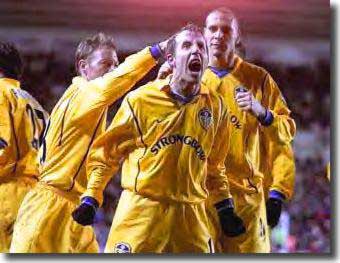 was
able to receive the ball and get in the box. If we have a sound base defensively,
we've always got players in the team who can pop up and score a goal like
that. It wasn't the prettiest of games, but we were unlucky not to be
a goal up at half time. It was a good, solid, workmanlike performance.
We know we can play better, but we have a spirit of togetherness. We stayed
solid and were always liable to score a goal. But we're not the finished
article by any means - we're a good team with a lot of maturing to be
done.'
was
able to receive the ball and get in the box. If we have a sound base defensively,
we've always got players in the team who can pop up and score a goal like
that. It wasn't the prettiest of games, but we were unlucky not to be
a goal up at half time. It was a good, solid, workmanlike performance.
We know we can play better, but we have a spirit of togetherness. We stayed
solid and were always liable to score a goal. But we're not the finished
article by any means - we're a good team with a lot of maturing to be
done.'
The revival seemed to be complete when two goals by Mark Viduka and a
special from Fowler gave Leeds an easy 3-0 victory at Elland Road against
West Ham on New Year's Day, restoring their position at the head of the
Premiership. It was as good a performance as the side had enjoyed all
season.
It seemed at long last, after a couple of turbulent years, that Leeds
United were finally going to realise all the potential they had hinted
at for three years under the leadership of David O'Leary. Unfortunately,
things are never that simple and everyone connected with Elland Road may
look back and wish that 2001/02 had ended on the first day of the New
Year.
Part 1 Pacesetters - Part
3 A season falls apart - Part 4 A summer
of change - Results and table













 the students left they got involved in a verbal confrontation with one
of Woodgate's friends, who had just been ejected from the club. A spokesman
for the West Yorkshire force said the five Asian youths were being chased
along Mill Hill when one of them fell over. The group of white men then
attacked him.
the students left they got involved in a verbal confrontation with one
of Woodgate's friends, who had just been ejected from the club. A spokesman
for the West Yorkshire force said the five Asian youths were being chased
along Mill Hill when one of them fell over. The group of white men then
attacked him. that autumn was too early and the Easter term too short for a trial expected
to last six weeks, which left only the Trinity term, beginning in June
2001.
that autumn was too early and the Easter term too short for a trial expected
to last six weeks, which left only the Trinity term, beginning in June
2001. I didn't ask him who was involved, that was the only thing that came out.'
Things looked bad. The matter led to long-term acrimony between Duberry
and Woodgate.
I didn't ask him who was involved, that was the only thing that came out.'
Things looked bad. The matter led to long-term acrimony between Duberry
and Woodgate. now
out of the way. We now want to go back to playing football and try to
get back to some kind of normality.
now
out of the way. We now want to go back to playing football and try to
get back to some kind of normality. Sarfraz
Najeib and the ordeal necessarily inflicted on the accused were the most
telling commentary on the dangers of alcohol abuse.
Sarfraz
Najeib and the ordeal necessarily inflicted on the accused were the most
telling commentary on the dangers of alcohol abuse. was
charged almost two years ago, Woodgate's form dipped and once the first
trial began last February, it slumped. He has been a shadow of a once
great centre-back.
was
charged almost two years ago, Woodgate's form dipped and once the first
trial began last February, it slumped. He has been a shadow of a once
great centre-back. and
myself, Jonathan Woodgate has been given a fine of eight weeks wages.
Jonathan has asked that this money be put towards funding work within
our inner city communities, which we are more than happy to agree to.
Jonathan will commit to work within our community programme. Jonathan
has also been given a final warning regarding his future conduct.
and
myself, Jonathan Woodgate has been given a fine of eight weeks wages.
Jonathan has asked that this money be put towards funding work within
our inner city communities, which we are more than happy to agree to.
Jonathan will commit to work within our community programme. Jonathan
has also been given a final warning regarding his future conduct. was
able to receive the ball and get in the box. If we have a sound base defensively,
we've always got players in the team who can pop up and score a goal like
that. It wasn't the prettiest of games, but we were unlucky not to be
a goal up at half time. It was a good, solid, workmanlike performance.
We know we can play better, but we have a spirit of togetherness. We stayed
solid and were always liable to score a goal. But we're not the finished
article by any means - we're a good team with a lot of maturing to be
done.'
was
able to receive the ball and get in the box. If we have a sound base defensively,
we've always got players in the team who can pop up and score a goal like
that. It wasn't the prettiest of games, but we were unlucky not to be
a goal up at half time. It was a good, solid, workmanlike performance.
We know we can play better, but we have a spirit of togetherness. We stayed
solid and were always liable to score a goal. But we're not the finished
article by any means - we're a good team with a lot of maturing to be
done.'